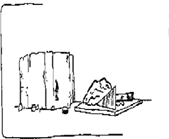
One
Two
Three
Four
Five
Six
Seven
Eight
Nine
Ten
Foundations
Introduction:
When a baby is born he is the most helpless of creatures. The bear has claws, the lion sharp teeth, and the cheetah lightning speed. Man appears most helpless. Man is born without shell (like the turtle), without spines (like the porcupine), without horns (like the ram). It seems that God has equipped each animal with some special means of defense and of survival. What has God given man? What can he use to fend off danger, defend himself and live happily in the world?
God has given man something greater than a shell in which to hide, greater than a claw with which he can tear and rend, or speed with which he can out-run danger. God has given man a mind. The mind of man gives him the advantage and the opportunity to scale higher than any mountain goat, go faster than any cheetah, warm himself better than any bear skin. God has given us a brain. Let's use it. If the animals we have mentioned do not use their God-given birthrights of advantage they will not survive. We Christians must use our minds as well to survive in this evil and sinful world.
We are saved by giving Christ our heart. We survive and successfully live the Christian life by giving Him our hearts and our minds as well. "Study to show thyself approved unto God, a workman that needeth not to be ashamed, rightly dividing the word of truth" (2Tim. 2:15). None of God's creatures have a longer childhood than man. The lion cub is off on its own in a very short time. The two-year-old thoroughbred is running at the Kentucky Derby. Only man takes eighteen years to prepare for life. Those years are years of training and learning. A "New creature in Christ," a "born-again" believer should have some training and preparation before venturing out into the world as well. Jesus trained his disciples for three and one half years before giving them their "Great Commission" to go into all the world and preach the Gospel. Even the Apostles had their "Basic Training " before wading into the fields of spiritual conflict. God has charged his ministers to "perfect the saints" for the work of the ministry (Eph. 4:11). We cannot perfect the saints without training them. Paul wrote, "Be transformed by the renewing of your mind" Rom. 12:2..
Some think Christianity and faith are just a religious feelings" others dismiss it as a superstition. Much foolishness is pawned off as faith because it refuses to submit to the tests of revelation (the Bible) and application (does it work?). Every believer should be able to explain what he or she believes and how it effects the way they live.
It is always a good idea to build the foundation before you build the house (Kings 6:37-38). Many believers will have trouble tomorrow, because they have not laid a good foundation today. In Hebrews 11 we are told that Abraham looked for a city which had "foundations." Abraham set out to know God. In the end, God called Abraham, "My friend." Psalm 11:3 asks a pertinent question. "If the foundations be destroyed, what shall the righteous do?" Satan knows how to capitalize upon your weakness and ignorance. If you are not able to give good reasons for what you believe your whole "Christian Experience" will be shaky. This study shall attempt to lay a strong foundation of Biblical ideas and principles upon which you can build. The end result will be a Christian philosophy of living that shall stand you well in all kinds of circumstances and situations.
With every church claiming to be "the true" church, a new Christian is likely to either just accept the practices and traditions of a particular group that has embraced him, or become confused as they try to negotiate between conflicting beliefs, practices, and requirements. One of the very fist lessons a new believer should learn is to differentiate between the major and the minor notes in the symphony of their Christian experience. What is the difference between a "conviction" and a "preference?" Many people hold up their prejudices as their faith while their preferences become part of their own personal Gospel. Some believers have their own list of things that are "sinful" and taboo, and delight in checking other people's lists so they may label them as "liberal" if some restriction is missing from their litany. There is a lot of hypocrisy and despotism that goes along with this kind of Christianity. We shall attempt to give you good reasons to believe what you believe, and do what you do. We would do well to understand the distinctions between goals, principles, standards, convictions, laws, and commandments. Many of the disagreements people have are the result of first failing to define their terms. Here we shall attempt to make some distinctions.